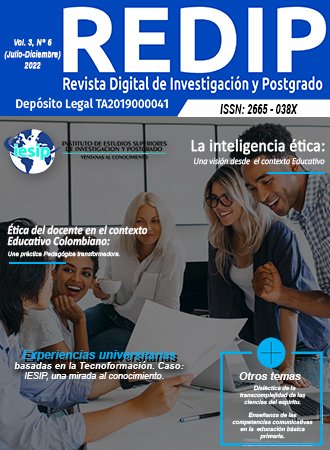Entrepreneuriat
Théories et formation àl'entrepreneuriat au niveau universitaire
DOI :
https://doi.org/10.59654/amhzce29Mots-clés :
emprendimiento, teorías, educación emprendedora.Résumé
L'objectif de cet article est de décrire l'entrepreneuriat à partir des théories qui l'expliquent et de
l'enseignement de l'entrepreneuriat à l'université. Le sujet fait l'objet d'une grande production scientifique dans le monde entier. L'idée d'entreprise, la création d'entreprise, la motivation pour l'entrepreneuriat font partie de ce qui est aujourd'hui considéré comme vital dans les universités parce que dans une économie globale, la croissance économique va de pair avec les alliances entre université-entreprise, université-institutions publiques, l'idée d'université entrepreneuriale et d'université qui forme des entrepreneurs est le nouveau modèle d'université. De même, l'esprit d'entreprise est expliqué à partir des théories du comportement humain, des attentes, de l'apprentissage social, du comportement planifié et de la théorie des besoins de McClellan. Cette dernière est la théorie qui domine les études expliquant la genèse de l'esprit d'entreprise. Néanmoins, les références théoriques et les études ont permis de s'assurer que l'enseignement de l'entrepreneuriat est en plein développement dans les universités ; un aspect très positif qui a conduit à l'innovation, à la révision des programmes d'études et à la compétitivité des universités.
Téléchargements
Références
Ajzen, I. (1991). The Theory of Planned Behavior. Organizational Behavior & Human Decision Processes, 50, 179-211. doi:10.1016/0749-5978(91)90020-T
Alshrari, A. D., Aljaaidi, K. S. & Hassan, O. W. K. (2021). Saudi Arabian 2030 vision and entrepreneurial intention among university students. AD-minister, (38), 43-62. https://doi.org/10.17230/ad-minister.38.2
Bandura, A. (1977). Self-efficacy: Toward a Unifying Theory of Behavioral Change. Psychological Review, 84(2), 191-215. https://www.google.com/url?sa=t&rct=j&q=&esrc=s&source=web&cd=&cad=rja&uact=8&ved=2ahUKEwi5-e3AlaCBAxUZmWoFHZO2CzwQFnoECA0QAQ&url=https%3A%2F%2Fpsycnet.apa.org%2Frecord%2F1977-25733-001&usg=AOvVaw09ekqzQXpC9Y2G2ZNHx2n-&opi=89978449
Bandura, A. (1982). Self-efficacy mechanism in human agency. American psychologist, 37(2), 122-147. https://www.google.com/url?sa=t&rct=j&q=&esrc=s&source=web&cd=&cad=rja&uact=8&ved=2ahUKEwjpoMqFlaCBAxXQmGoFHXUADQAQFnoECA0QAQ&url=https%3A%2F%2Fpsycnet.apa.org%2Frecord%2F1982-25814-001&usg=AOvVaw1S8ZNX2_vOE8zp46lKLIyr&opi=89978449
Caicedo, G. (didiembre de 2013). El rol de la universidad en ecosistemas de innovación. ASPAE, 3(30). https://www.google.com/url?sa=t&rct=j&q=&esrc=s&source=web&cd=&cad=rja&uact=8&ved=2ahUKEwjIlr_TlaCBAxUBlWoFHUVKAN4QFnoECA0QAw&url=https%3A%2F%2Feventos.espol.edu.ec%2Fagenda%2Fshow_event%2F81503%2Fel-rol-de-las-universidades-en-los-ecosistemas-de-innovacion.html%23%3A~%3Atext%3DLas%2520universidades%2520contribuyen%2520directa%2520e%2Ccon%2520los%2520ecosistemas%2520de%2520emprendimiento.&usg=AOvVaw3Z_0u1ZXPVOeFhRXZXNDjY&opi=89978449
Calzado-Barbero, M., Fernández-Portillo, A. y Almodovar-González, M. (2019). Educación emprendedora en la universidad. Journal of Management and Business Education, 2(2), 127-159. https://dialnet.unirioja.es/servlet/articulo?codigo=7291790
Carland, J. W., Hoy, F. & Carland, J. A. (1988). Who is an enterpreneur? Is a question whorthasking. American Journal of small business, 13, 33-39.
Erez, A. & Isen, A. M. (2002). The Influence of Positive Affect on the Components of Expectancy Motivation. Journal of Applied Psychology, 87(6), 1055-1067. https://www.google.com/url?sa=t&rct=j&q=&esrc=s&source=web&cd=&cad=rja&uact=8&ved=2ahUKEwj13-KJk6CBAxXQmGoFHQ05DywQFnoECA0QAQ&url=https%3A%2F%2Fpubmed.ncbi.nlm.nih.gov%2F12558213%2F&usg=AOvVaw1KqwgnQGm5CEdV_-RImlxV&opi=89978449
García-Peñalvo, F. J. (2016). La tercera misión. Education in the Knowledge Society (EKS), 17(1), 7-18 (2016). https://revistas.usal.es/index.php/eks/article/view/eks2016171718/14803
Gatewood, E; Shaver, K; Powers, J & Gartner, W. (2002). Entrepreneurial expectancy, task effort, and performance. Entrepreneurship Theory and Practice, 27(2), 187-206. doi:10.1111/1540-8520.00011
Guerrero, M. y Urbano, D. (2012). Transferencia de conocimiento y tecnología. Mejores prácticas en las universidades emprendedoras españolas. Gestión y política pública. XXI(1), 107-139. http://www.scielo.org.mx/pdf/gpp/v21n1/v21n1a4.pdf
Kantis, H., y Angelelli, P. (2020). Emprendimientos de base científico-tecnológica en América Latina: Importancia, desafíos y recomendaciones para el futuro. Banco Interamericano de Desarrollo. Doi: 10.18235/0002156
Krueger, N. F. & Carsrud, A. (1993). Entrepreneurial intentions: Applying the theory of Planned behaviour. Entrepreneurship and Regional Development, An International Journal 5(4), 315-330. https://www.tandfonline.com/doi/abs/10.1080/08985629300000020
Krueger, N. F. & Brazeal, D. V. (1994). Entrepreneurial Potential and Potential Entrepreneurs. Entrepreneurial Theory and Practice, 91-104. https://cemi.com.au/sites/all/publications/Krueger%20and%20Brazeal%201994.pdf
Marulanda, V. A., Montoya, R. I. A., Vélez, R. J. M. (2014). Teorías motivacionales en el estudio del emprendimiento. Pensamiento y gestión( 36), 206-238. https://www.google.com/url?sa=t&rct=j&q=&esrc=s&source=web&cd=&cad=rja&uact=8&ved=2ahUKEwiR8Zb2k6CBAxUkkmoFHRBRBvIQFnoECB0QAQ&url=http%3A%2F%2Fwww.scielo.org.co%2Fscielo.php%3Fscript%3Dsci_arttext%26pid%3DS1657-62762014000100008&usg=AOvVaw3JomRpv8b2d63PplFrI6mG&opi=89978449
Ocampo-López, C., Ramírez-Carmona, M., Rendón-Castrillón, L., & Vélez-Salazar, Y. (2019). Applied research in biotechnology as a source of opportunities for green chemistry start-ups. Sustainable Chemistry and Pharmacy, 11, 41-45. Doi: 10.10 16/j.scp.2018.12.005
Pacheco-Ruiz, C., Rojas-Martínez, C., Niebles-Nuñez, W. y Hernández-Palma, H. G. (2022). Caracterización del emprendimiento desde un enfoque universitario. Formación universitaria, 15(1), 135-144. https://dx.doi.org/10.4067/S0718-50062022000100135
Papadaki, Š., Novák, P. y Dvorský, J. (2017). Attitude of university students to entrepreneurship. Economic Annals-XXI, 166(7-8), 100-104. http://ea21journal.world/index.php/ea-v166-20/
Renko, M., Kroeck, K., & Bullough, A. (2012). Expectancy Theory and Nascent Entrepreneurship. Small Business Economics, 39, 667-684. https://doi.org/10.1007/s11187-011-9354-3
Rodríguez, C. y Jiménez, M. (2005). Emprenderismo, acción gubernamental y academia. Revisión de la literatura, 15(26), 73-89. https://revistas.unal.edu.co/index.php/innovar/article/view/40/73
Rojas, G. Y., Pertuz, V., Navarro, A. y Quintero, L. T. (2019). Instrumento para Identificar Características Personales y Didáctica Utilizadas por los Docentes en la Formación de Emprendedores. Formación Universitaria, 12(2), 29-40. https://www.google.com/url?sa=t&rct=j&q=&esrc=s&source=web&cd=&cad=rja&uact=8&ved=2ahUKEwjL9Pzpl6CBAxXVlWoFHTTUCbEQFnoECBcQAQ&url=http%3A%2F%2Fwww.scielo.cl%2Fscielo.php%3Fscript%3Dsci_arttext%26pid%3DS0718-50062019000200029&usg=AOvVaw0ZwCM5Y7VQWWrMs-5W1IN_&opi=89978449
Shaver, K. G. (2004). Overview: The cognite characteristics of the enterpreneur. Handbook of Entrepreneurial Dynamics: The Process of Business Creation, 131-137.
Valenzuela-Keller, A. A., Gálvez-Gamboa, F. A. y Moreno-Villagra, M. (2021). Actitudes emprendedoras de estudiantes universitarios de primer año en Chile. Formación universitaria, 14(4), 103-112. https://www.scielo.cl/scielo.php?script=sci_arttext&pid=S0718-50062021000400103&lang=es
Van Eerde, W. & Thierry, H. (1996). Vroom’s Expectancy Models and WorkRelated Criteria: A Meta-Analysis. Journal of Applied Psychology, 81(5), 575-586. https://psycnet.apa.org/record/1997-41278-010
Téléchargements
Publiée
Numéro
Rubrique
Licence
(c) Copyright Revista Digital de Investigación y Postgrado 2022

Ce travail est disponible sous licence Creative Commons Attribution - Pas d’Utilisation Commerciale - Partage dans les Mêmes Conditions 4.0 International.
Esta licencia permite a los reutilizadores distribuir, remezclar, adaptar y desarrollar el material en cualquier medio o formato únicamente con fines no comerciales, y solo siempre que se atribuya al creador. Si remezclas, adaptas o construyes sobre el material, debes licenciar el material modificado bajo términos idénticos. CC BY-NC-SA incluye los siguientes elementos:
![]() POR: se debe dar crédito al creador.
POR: se debe dar crédito al creador.![]() NC: Sólo se permiten usos no comerciales de la obra.
NC: Sólo se permiten usos no comerciales de la obra.![]() SA: Las adaptaciones deben compartirse en los mismos términos.
SA: Las adaptaciones deben compartirse en los mismos términos.











